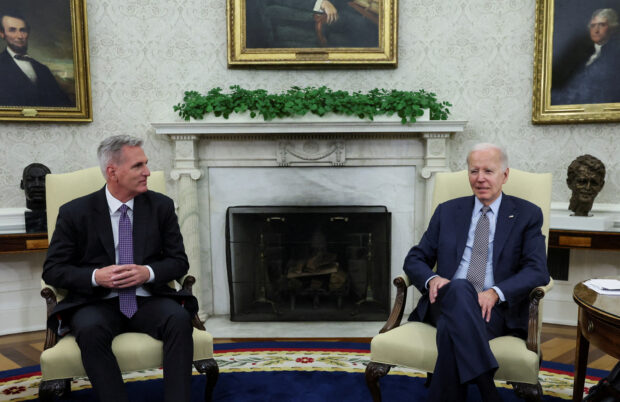
FILE PHOTO: U.S. President Joe Biden hosts debt limit talks with U.S. House Speaker Kevin McCarthy (R-CA) in the Oval Office at the White House in Washington, U.S., May 22, 2023. REUTERS/Leah Millis/File photo
WASHINGTON -U.S. President Joe Biden and top congressional Republican Kevin McCarthy on Thursday appeared to be nearing a deal to cut spending and raise the government’s $31.4 trillion debt ceiling, with little time to spare to head off the risk of default.
The deal would specify the total amount the government could spend on discretionary programs like housing and education, according to a person familiar with the talks, but not break that down into individual categories. The two sides are just $70 billion apart on a total figure that would be well over $1 trillion, according to another source.
The two sides met virtually on Thursday, the White House said. Representative Garret Graves, the top Republican negotiator, told reporters on Thursday evening that conversations would continue into the night.
Republican negotiators have backed off plans to increase military spending while cutting non-defense spending and instead backed a White House push to treat both budget items more equally, a source familiar with the talk told Reuters.
Biden said they still disagreed over where the cuts should fall.
“I don’t believe the whole burden should fall back to middle class and working-class Americans,” he told reporters.
Graves told reporters that the White House is “refusing to negotiate on work requirements” for anti-poverty programs, which he called “crazy.” He said disagreements over funding social security and Medicare versus work requirements remains an issue between the two sides.
“We have a lot of hang ups but that’s one of the big ones,” he said as he left McCarthy’s office, adding that “we’re not going to stop negotiating.”
House Speaker McCarthy told reporters Thursday evening that the two sides have not reached a deal. “We knew this would not be easy,” he said.
It is unclear precisely how much time Congress has left to act. The Treasury Department was warned that it could be unable to cover all its obligations as soon as June 1, but on Thursday said it would sell $119 billion worth of debt that will come due on that date, suggesting to some market watchers that it was not an iron-clad deadline.
“They have suggested in the past that they would not announce auctions that they did not believe they had the means to settle,” Gennadiy Goldberg, senior rates strategist at TD Securities in New York. “So I do think that’s a positive note.”
Any agreement will have to pass the Republican-controlled House of Representatives and the Democratic-controlled Senate. That could be tricky, as some right-wing Republicans and many liberal Democrats said they were upset by the prospect of compromise.
“I don’t think everybody’s going to be happy at the end of the day. That’s not how the system works,” McCarthy said.
The House adjourned on Thursday afternoon for a week-long break, and the Senate is not in session. Lawmakers have been told to be ready to come back to vote if a deal is reached.
The deal would only set broad spending outlines, leaving lawmakers to fill in the blanks in the weeks and months to come.
It would specify the total amount of military spending, which has been a key sticking point in the talks, one of the sources said.
Biden has resisted Republican proposals to stiffen work requirements for anti-poverty programs and loosen oil and gas drilling rules, according to Democratic Representative Mark Takano.
Representative Kevin Hern, who leads the powerful Republican Study Committee, told Reuters a deal was likely by Friday afternoon.
‘Time’s up’
Democrats on Thursday focused their attacks on what they said would be devastating cuts in federal aid for veterans — ranging from healthcare and food aid to housing assistance — if Republicans got their way in the negotiations.
“Time’s up for all of these games around here,” Democratic Representative Don Davis, a U.S. Air Force veteran, said at a press conference.
A U.S. default could upend global financial markets and push the United States into recession.
Credit rating agency DBRS Morningstar put the United States on review for a possible downgrade on Thursday, echoing similar warnings by Fitch, Moody’s and Scope Ratings. Another agency, S&P Global, downgraded U.S. debt following a similar debt-ceiling standoff in 2011.
The months-long standoff has spooked Wall Street, weighing on U.S. stocks and pushing the nation’s cost of borrowing higher.
Deputy Treasury Secretary Wally Adeyemo said concerns about the debt ceiling had pushed up the government’s interest costs by $80 million so far.
Lawmakers regularly need to raise the self-imposed debt limit to cover the cost of spending and tax cuts they have already approved.
House lawmakers will get three days to read any debt-ceiling bill before they have to vote on it.
McCarthy has insisted that any deal must cut discretionary spending next year and cap spending growth in the years to come, to slow the growth of the U.S. debt, now equal to the annual output of the economy.
He also said he had briefly spoken about the negotiations with former President Donald Trump, who has publicly urged Republicans to allow a default if they fall short of their goals.
Biden has offered to freeze spending at current levels next year and proposed several tax increases to help curb the debt.
Lawmakers on the parties’ right and left flanks are growing frustrated. Republican Representative Chip Roy, a member of the hard-right Freedom Caucus, has insisted that any deal must include the sharp spending cuts they passed last month.
Some Democrats, meanwhile, say Biden has not been vocal enough about the downsides to Republicans’ proposed spending cuts, in contrast to McCarthy who has been briefing reporters multiple times per day.
“I would urge the president to use the power of the bully pulpit of the presidency,” said Democratic Representative Steven Horsford.
READ:
https://business.inquirer.net/402566/republicans-white-house-see-progress-in-us-debt-ceiling-talks
https://business.inquirer.net/402559/fitch-puts-us-rating-on-negative-watch-as-debt-deadline-looms